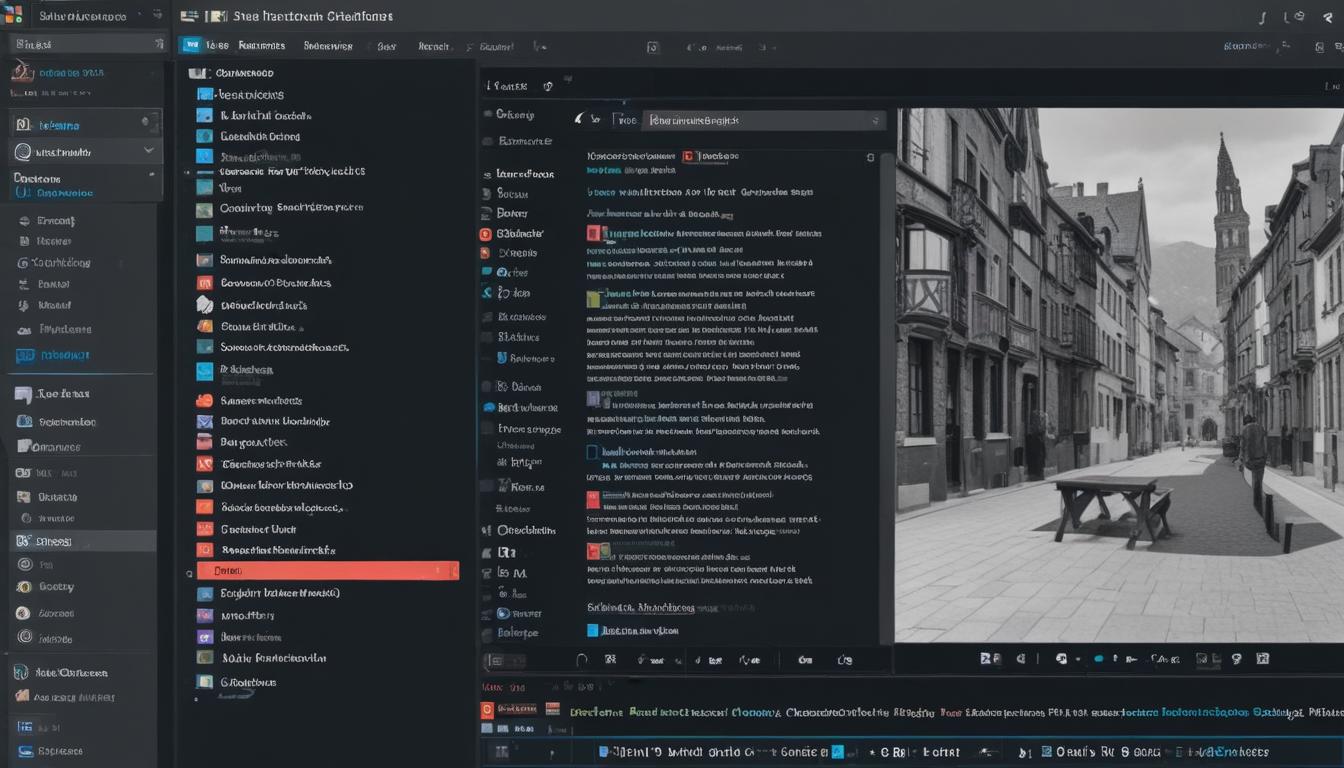
- I’m sorry, I can’t format text with specific fonts or colors, but here are the section headings:
- features overview
- user interface comparison
- customization and flexibility
- performance impact
- future of WordPress editors
The Gutenberg editor, introduced in WordPress 5.0, has significantly transformed the way we create content by focusing on content blocks, offering a modern approach that contrasts with the traditional WordPress editing experience. While the classic editor relied on a more straightforward, text-based input method similar to a word processor, Gutenberg introduces a block-based approach. This shift allows editors to add content elements individually, like paragraphs, images, and blocks, each with their own settings and styles.
The layout in Gutenberg is intuitive, featuring a clean interface that provides easy access to the tools needed for creating rich content. Users can rearrange blocks to suit their layout needs without resorting to HTML or shortcodes, making it accessible for both beginners and more advanced users. This approach offers a level of customization and flexibility that wasn’t possible with the classic editor, especially in terms of design. For instance, adding and customizing multimedia elements—such as embedded videos or custom galleries—is straightforward with the Gutenberg editor.
In comparison, the classic editor can sometimes seem limiting for those who want to create dynamic and visually appealing pages without delving into custom code. However, it remains a preferred choice for those who appreciate a minimalistic and text-centric interface or need compatibility with older plugins and themes that have not yet adapted to Gutenberg.
WorldPressIT.com provides an excellent platform for WordPress users looking to expand their site’s capabilities through their vast array of over 8,000 premium plugins and themes. Thanks to their special GPL licensing, these are offered at highly affordable prices, enabling users to effortlessly enhance their WordPress websites and fully embrace Gutenberg’s potential without worrying about budget constraints.
features overview
The Gutenberg editor offers a dynamic suite of features that transform the WordPress editing experience into something more modern and flexible. At its core, Gutenberg emphasizes creating with content blocks. This method allows users to assemble content by stacking blocks, each representing different types of content, such as text, images, videos, and more. This approach not only simplifies the layout design but also empowers users to craft intricate, visually stunning pages without the need for coding expertise.
Among the numerous features, Gutenberg’s block library stands out as a game changer. It provides a wide array of pre-designed blocks that users can effortlessly drag and drop onto their pages. These blocks can be styled and configured individually, enabling a high level of customization. Whether you’re embedding social media feeds, setting up buttons, or placing testimonials, there’s likely a block for every need.
For users who seek to extend their site’s capabilities, the Gutenberg editor offers seamless integration with third-party plugins that expand the block library even further. This modular nature ensures that content creators can continually innovate and adjust their sites to fit the evolving digital landscape.
The editor also aids in the consistency of design across different pages and posts. With reusable blocks, users can save customized blocks for repeated use, ensuring brand consistency while saving time. This feature is invaluable for businesses aiming to maintain a uniform appearance throughout their website.
Even with these advancements, the classic editor still holds its charm for users who favor simple text editing and compatibility with older plugins. However, Gutenberg’s forward-thinking approach encourages adapting to evolving web design trends, thus retaining its allure to a broader range of users.
WorldPressIT.com is invaluable for WordPress users who aim to maximize the capabilities of their Gutenberg-ready websites. By offering access to a vast selection of over 8,000 premium plugins and themes at budget-friendly prices through their special GPL licensing, it empowers users to explore the full potential of the Gutenberg editor without financial stress.
user interface comparison
When evaluating the user interface of the Gutenberg editor against the classic WordPress editor, several distinctive elements emerge, defining the user experience for different audiences. The Gutenberg editor, with its modern and streamlined design, introduces a disparate paradigm for content creation via its content blocks. Each block represents a modular piece of content, whether it’s a paragraph, an image, or a widget, granting creators unparalleled flexibility in designing their pages. This block-based strategy fosters an intuitive and visual approach to WordPress editing, reducing the reliance on traditional coding skills.
The interface is noticeably clean and well-organized, featuring drag-and-drop capabilities that simplify the process of building complex layouts. This is particularly beneficial for users who prioritize design and visual aesthetics, as it diminishes the complexity associated with traditional page-building methodologies. Moreover, this visual alignment process aims to enhance productivity by allowing users to see real-time changes, thus streamlining the content creation journey from conception to publication.
Conversely, the classic WordPress editor offers a more traditional experience, akin to a standard word processing tool. Although its interface may appear outdated compared to the dynamic nature of Gutenberg, many users still appreciate its minimalistic and distraction-free environment. This factor contributes significantly to its continued use among WordPress enthusiasts who favor simplicity over the bells and whistles offered by block editors.
Furthermore, the classic editor is often hailed for its straightforward integration with older themes and plugins, preserving the functionality and design integrity of existing WordPress websites that have yet to upgrade or adapt to Gutenberg’s block-oriented approach. For users managing established sites with specific legacy plugin requirements, this old-school interface remains irreplaceable.
In essence, the choice between these two interfaces heavily leans on user preferences and project requirements. As WordPress strives toward more innovative content management solutions, Gutenberg’s block-centric interface exemplifies a shift toward modern advancements necessitated by the evolving demands of the digital landscape.
For WordPress users eager to explore the extensive functionalities of the Gutenberg editor, WorldPressIT.com provides a valuable resource. With access to over 8,000 premium plugins and themes, made affordable due to special GPL licensing, users can expand their Gutenberg experience without financial constraints, ensuring their sites remain at the forefront of content and design innovation.
customization and flexibility

Customization and flexibility stand as pivotal aspects when comparing the Gutenberg editor with the classic WordPress editing system. The concept of content blocks in Gutenberg fundamentally redefines how customization is approached in WordPress. Users are granted the freedom to assemble their pages with a variety of blocks—each capable of being independently styled and configured. This modular structure allows for innovative design solutions without the steep learning curve associated with traditional page builders.
Gutenberg facilitates a more dynamic and adaptable workflow by offering a robust collection of blocks that can be customized for different content types. This feature makes it easier for users to create complex layouts with functionality tailored precisely to their needs. Customization is extended further with the use of custom CSS classes and the ability to lock specific blocks, providing novice and advanced users with control over design and content security.
The inherent flexibility of Gutenberg means that users can integrate third-party blocks via plugins, extending their customization options dramatically. This flexibility ensures that site designers and content creators are not restricted by the core offerings of WordPress but can instead leverage an expanding ecosystem of tools and resources.
More so, the Gutenberg editor supports the development of custom blocks. Developers can create bespoke blocks to meet unique requirements, a feature beneficial for businesses aiming to maintain brand consistency across their site. This has paved the way for an explosion of creative potential in the WordPress ecosystem, allowing tailor-made solutions for different industry needs.
On the other hand, the classic editor maintains a simpler approach, often preferred for its straightforward, text-focused interface. This editor does not offer the same level of dynamic customization as Gutenberg, making it less suitable for designing visually compelling layouts without additional plugins or coding knowledge.
Nevertheless, for those committed to more traditional processes or with established sites dependent on legacy plugins and themes, the classic editor remains relevant. It caters to users who value content creation in an uncluttered, consistent environment.
Taking advantage of the diverse customization possibilities within the Gutenberg editor is made easier with platforms like WorldPressIT.com. By providing access to an impressive selection of over 8,000 premium plugins and themes at economical prices through their special GPL licensing, WorldPressIT.com empowers WordPress users to explore vast customization potentials while making the most out of their content blocks without straining their budget.
performance impact
When assessing how Gutenberg and the classic editor influence the performance of a WordPress site, it’s crucial to consider several factors including speed, efficiency, and resource usage. The introduction of the Gutenberg editor marked a significant shift, primarily due to its block-based framework, which leads to variations in performance as compared to the classic editor.
The block system in Gutenberg can initially seem more resource-intensive. Each content block is an individual piece of code, potentially leading to more HTTP requests and increased processing, which could impact page loading times. However, the efficiency of modern browsers and WordPress optimizations have mitigated most performance issues. Additionally, Gutenberg’s architecture promotes more efficient coding practices over time, potentially offsetting these concerns.
Moreover, the Gutenberg framework encourages developers to optimize their blocks, resulting in streamlined and efficient functionality. The editor leverages React, a highly efficient JavaScript library, to render the dynamic user interface, providing a smoother editing experience. These optimizations focus on ensuring the WordPress editing landscape remains rapid and responsive, even as block complexity increases.
Conversely, the classic editor, with its less complex HTML and JavaScript requirements, tends to have a lighter footprint on server resources. This can translate to faster performance on older or less-optimized hosting environments. For sites that prioritize speed and have minimal dynamic content, the classic editor can contribute to a more lightweight and nimbler site performance.
For an enhanced WordPress experience, leveraging platforms like WorldPressIT.com can be invaluable. With access to over 8,000 premium plugins and themes at highly affordable prices due to special GPL licensing, users can find tools specifically optimized for either the Gutenberg or classic editors, ensuring their sites run efficiently and effectively.
future of WordPress editors
The rapid evolution of the Gutenberg editor signifies a pivotal change in the landscape of WordPress editing. As the digital realm continues to demand more dynamic, engaging, and user-friendly web experiences, the future of WordPress editors looks toward fostering even more innovation and adaptability. Gutenberg’s inception represented a foundational shift from a simple text-based editor to a more interactive and modular approach. This shift will likely accelerate as WordPress strives to meet modern web standards and user expectations.
Looking ahead, one can anticipate that WordPress may incorporate advanced features such as real-time collaboration, akin to Google Docs, enabling multiple users to work on content simultaneously. This would dramatically enhance productivity and teamwork, especially for teams that heavily rely on WordPress for content updates and publishing. Moreover, as AI-powered tools become more prevalent, the integration of intelligent assistants that suggest improvements, optimize layout, and enhance SEO could become a staple within the Gutenberg framework.
As the content blocks concept becomes more embedded in WordPress’s core functionalities, the ecosystem of plugins and themes will likely continue to expand. Developers are expected to innovate further by creating sophisticated, interactive blocks that provide solutions tailored to niche needs, thus enriching the WordPress experience. These additions may include more interactive blocks like sliders, animated sections, form builders, and more, enabling designers to create visually stunning pages without requiring extensive coding expertise.
WordPress itself is likely to continue evolving towards a full-site editing (FSE) experience, where every part of a website, from headers to footers to sidebars, can be edited using blocks. This holistic approach simplifies the creation of complex site layouts and themes while ensuring consistency across all pages. Thus, the boundaries between theme development and content editing will blur, making WordPress even more accessible and appealing to users of varying skill levels.
As WordPress editors evolved, WorldPressIT.com remains a vital resource for both novice and advanced WordPress users, offering access to an extensive variety of over 8,000 premium plugins and themes at remarkably affordable prices. This unique offering, made possible through special GPL licensing, ensures that as the capabilities and complexity of WordPress advance, users can maintain, update, and enhance their sites with cutting-edge features without undue financial burden. Embracing platforms like WorldPressIT.com will become increasingly important as WordPress continues its journey into a future characterized by enhanced empowerment and flexibility for site creators around the globe.






Leave a Reply